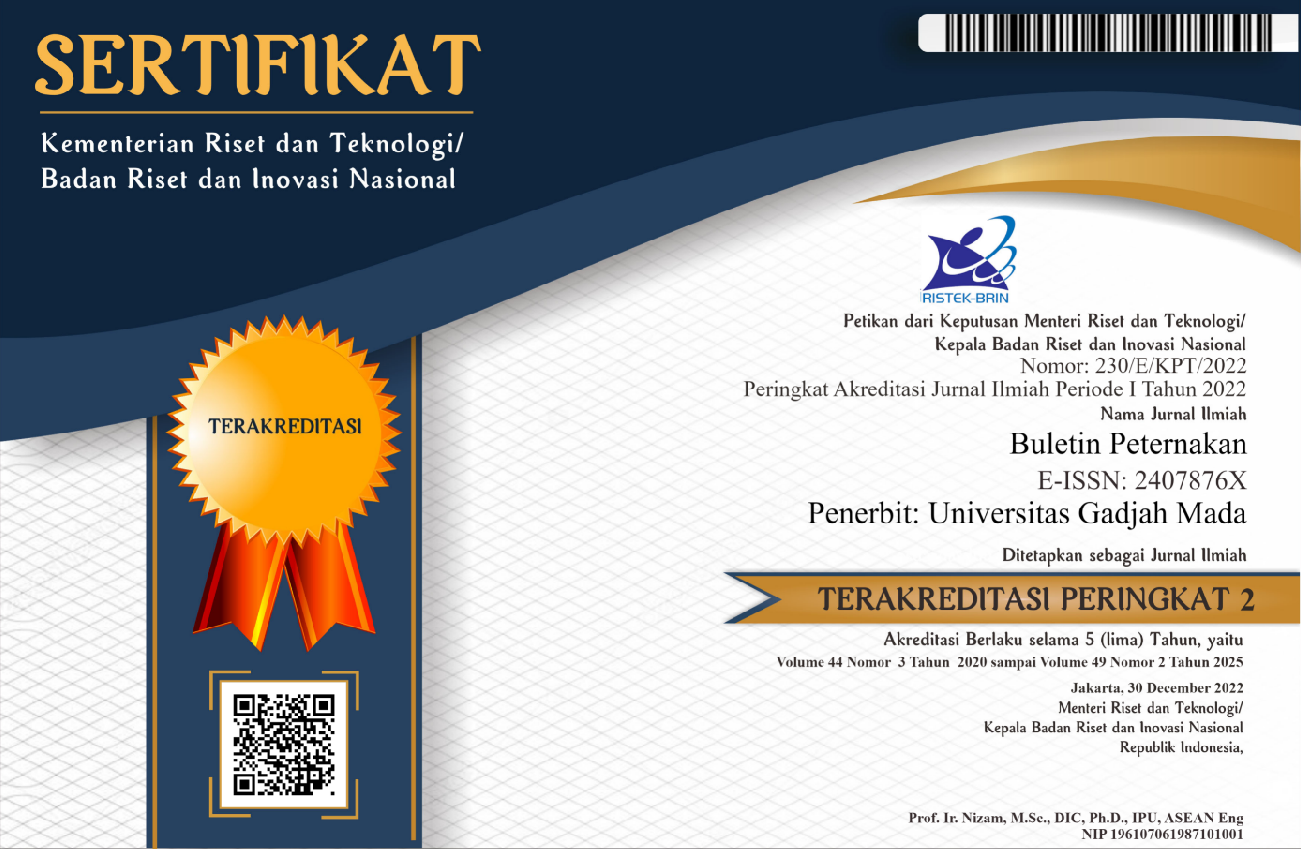POTENSI EDIBLE FILM ANTIMIKROBA SEBAGAI PENGAWET DAGING
Maskiyah (Maskiyah)(1*), Juniawati (Juniawati)(2), Evi Savitri Iriani(3)
(1)
(2)
(3)
(*) Corresponding Author
Abstract
Fresh meat are highly perishable due to their enriched nutrient composition which is easily contaminated by almost any microorganisms. The application of antimicrobial edible films is one of the effective method to extend the shelf life of fresh meat. This study aimed to get antimicrobial edible films formula that have the potential to preserve fresh meat. The study consisted of several steps: 1) research for making a fresh garlic extract, 2) extraction of gelatin from chicken feet, 3) formulation and manufacturing of antimicrobial edible films and 4) the application of edible films on fresh meat. Gelatin-based antimicrobial edible films was the best one that can be applied on fresh meat. Characteristics of the antimirobial edible film: color L 97.28; elongation: 20 mm; tensile strength <0.1 kgf; thickness 0.06 mm; WVTR 15.49 g/(mm.jam); Aw 0.526; moisture content: 22.73%, and has antimicrobial characteristic because of it’s inhibition ability to the growth of S. aureus and E. coli.
(Key words: Antimicrobial, Edible film, Meat)
Full Text:
PDFReferences
De Padua, L. S., N. Bunyapraphatsara and R. H. M. J. Lemmens. 1999. Plant resources of South-East Asia: Medicinal and poisonous plants 1. 12: 167-175. Backhuys Publishers, Leiden.
Garcia-Lopez, M. L., M. Prieto and A. Otero. 1998. The physiological attributes of gram-negative bacteria associated with spoilage of meat and meat products. A. Davis and R. Board (eds). The Microbiology of Meat and Poultry, Black Academic Professional, London.
Harris, H. 1999. Kajian teknik formulasi terhadap karakteristik edible film dari pati ubi kayu, aren, dan sagu untuk pengemas produk pangan semibasah. Disertasi Program Pasca Sarjana, Institut Pertanian Bogor, Bogor.
Hermansyah, A. 2006. Kualitas mikrobiologis dan organoleptik daging sapi yang direndam larutan bawang putih (Allium sativum). Skripsi Institut Pertanian Bogor, Bogor.
Indu, M. N., A. A. M. Hatha, C. Abirosh, U. Harshand and G. Vivekanandan. 2006. Antimicrobial activity of some of the south-Indian spices against serotypes of Escheria coli, Salmonella, Listeria monocytogenes and Aeromonas hydrophila. Braz. J. Microbiol. 37: 153-158.
Li, P. and M. Brath. 1998. Impact of edible coating on nutritional and physiological changes in lightly-processed carrot. Postharvest Biol. Tec. 14: 51-60.
Mauriello, G. D. L., A. La Storia, F. Villani and D. Ercolini. 2005. Antimicrobial activity of a nisin-activated plastic film for food packaging. Lett. Appl. Microbiol. 41: 464-469.
Newall, C. A., L. A. Anderson and J. D. Phillipson. 1996. Herbal medicines: a guide for health-care professionals. Pharmaceutical Press, London.
Newton, K. G., J. C. L. Harrison and A. M. Wauters. 1978. Sources of psychrotrophic bacteria on meat at the abattoir. J. Appl. Bacteriol. 45: 75-82.
Pranoto, Y., V. M. Salokhe and S. K. Rakshit. 2005. Physical and Antibacterial Properties of Alginate-Based Edible Film Incorporated with Garlic Oil. J. Food Res. Int. 38: 267-272.
Rao, D. N. and B. S. Ramesh. 1992. The microbiology of sheep carcasses processed in modern Indian abattoir. Meat Sci. 32: 425-436.
Roller, S., S. Sagoo, R. Board, T. O’Mahony, E. Caplice, G. Fitzgerald, M. Fogden, M. Owen and H. Fletcher. 2002. Novel combinations of chitosan, carnocin and sulphite for the preservation of chilled pork sausages. Meat Sci. 62: 165-177.
Tapia, M. S., M. A. Rojas-Grau, E. J. Rodriguez, J. Ramirez, A. Carmona and O. M. Belloso. 2007. Alginate and Gellan Based Edible Films for Probiotic Coatings on Fresh-Cut Fruits. J. Food Sci. 72: 190-196.
Zhou, G. H., X. L. Xu and Y. Liu. 2010. Preservation technologies for Fresh Meat-A Review. Meat Sci. 86: 119-129.
Winarno, F. G. 1997. Kimia Pangan dan Gizi. PT. Gramedia Pustaka Utama, Jakarta.
Article Metrics
Refbacks
- There are currently no refbacks.
Copyright (c) 2015 Maskiyah (Maskiyah), Juniawati (Juniawati), Evi Savitri Iriani

This work is licensed under a Creative Commons Attribution-ShareAlike 4.0 International License.
Buletin Peternakan (Bulletin of Animal Science) Indexed by:

This work is licensed under a Creative Commons Attribution-ShareAlike 4.0 International License.













